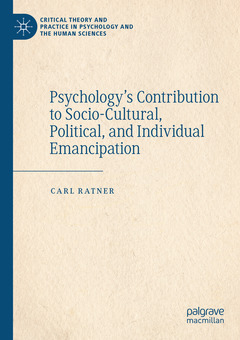Psychology’s Contribution to Socio-Cultural, Political, and Individual Emancipation, 1st ed. 2019 Critical Theory and Practice in Psychology and the Human Sciences Series

This book articulates how psychologists can use their theory, research, and intervention to generate insights into emancipatory social change that is necessary to solve social and psychological problems. These include racism, sexism, civil rights, poverty, militarism, education, and politics.
Psychology was not developed to directly address social issues. It must therefore be reconceptualised to fulfil this aim. In this book Carl Ratner makes use of Vygotsky?s psychological approach known as ?cultural-historical psychology?, supplemented by Martin-Baro?s Liberation Psychology and the work of Bourdieu and Foucault to develop an emancipatory psychological theory. This approach is then utilized to lay out a specific program of social and psychological emancipation. This reconstructed psychological theory is also used to evaluate populist movements that aim at social and psychological emancipation. Ratner posits that populism is inadequate to solve social and psychological problems because it misunderstands the nature of society and what it takes to improve society and psychology. This is demonstrated through wide-ranging examples including populist feminism, populist socialism, and populist distortions of liberation psychology and cultural-historical psychology.
This lively critique opens a pathway for academic across the social sciences concerned with how their disciplines can be oriented toward understanding and solving social-psychological problems, and will appeal to wide readership including policy makers, and social activists.
Section I: Developing a Psychological Theory for Scientifically Understanding and Enriching Psychology and Society.- 1: Introduction: Defining Emancipation That Forms the Parameters of Emancipatory, Scientific Psychology.- 2: Martin-Baro’s Liberation Psychology.- 3: Vygotsky’s Marxist Psychology Is the Scientific Psychology for Advancing Social-Psychological Emancipation.- 4: Social-Psychological-Political Emancipation According to Cultural-Historical/Macro Cultural Psychology.- Section II: Utilizing Vygotsky’s Marxist Psychology/Macro Cultural Psychology to Assess and Advance Populist Emancipatory Movements.- 5: Contemporary Populism.- 6: The Populist Debasing of Social Theory: Liberation Psychology, Cultural-Historical Psychology, and Historical Materialism.- 7: Emancipation or Fascism.
Carl Ratner is Director of the Institute for Cultural Research and Education, USA and a cultural psychologist working on political aspects of psychology and culture. He is active in the cooperative movement and his previous works include Politics of Cooperation & Co-Ops (2016) and Neoliberal Psychology (2019).
Date de parution : 11-2020
Ouvrage de 344 p.
14.8x21 cm
Disponible chez l'éditeur (délai d'approvisionnement : 15 jours).
Prix indicatif 63,29 €
Ajouter au panierDate de parution : 11-2019
Ouvrage de 344 p.
14.8x21 cm
Thèmes de Psychology’s Contribution to Socio-Cultural... :
Mots-clés :
social emancipation; cultural emancipation; political emancipation; democratic socialism; multiculturalism; human rights; cultural politics; Marx; Vygotsky; Liberation Psychology; Cultural-historical psychology; Historical Materialism; Indigenous Psychology; identity politics; psychoanalysis; cultural historical activity theory; populism; feminism; socialism; activism



